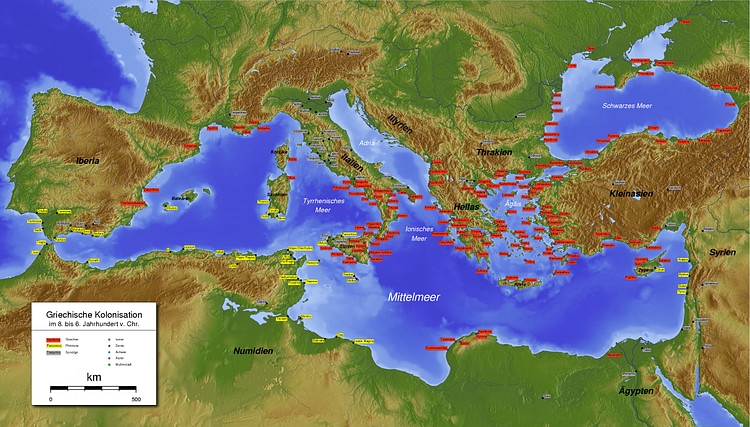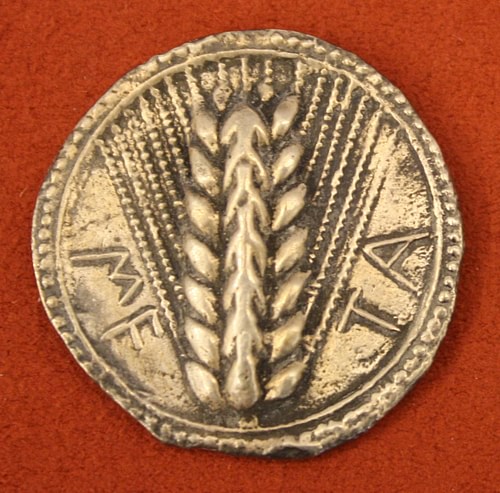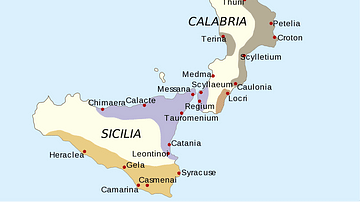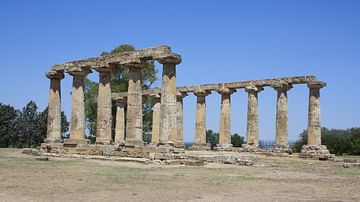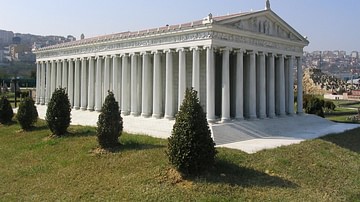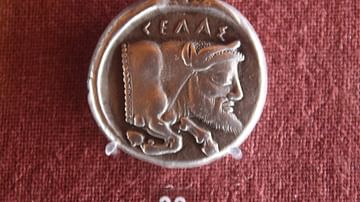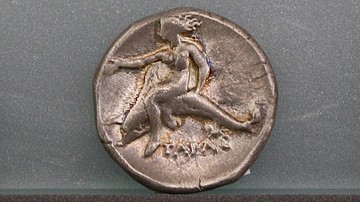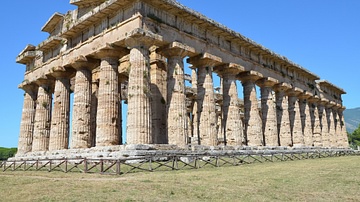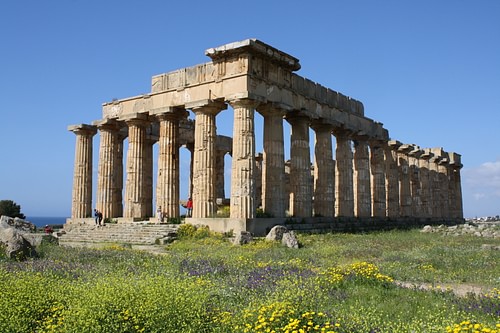
From around 800 BCE, ancient Greek city-states, most of which were maritime powers, began to look beyond Greece for land and resources. As a consequence, they founded colonies across the Mediterranean. Trade was usually the first step in the colonization process and then, after local populations were subdued or included within the colony, cities were established.
These could have varying degrees of contact with the homeland, but most became fully independent city-states, sometimes very Greek in character, in other cases culturally closer to the indigenous peoples they neighboured and included within their citizenry. One of the most important consequences of this process, in broad terms, was that the movement of goods, people, art, and ideas in this period spread the Greek way of life far and wide to Spain, France, Italy, the Adriatic, the Black Sea, and North Africa. In total then, the Greeks established some 500 colonies which involved up to 60,000 Greek citizen colonists, so that by 500 BCE these new territories would eventually account for 40% of all Greeks in the Hellenic World.
Trade & Resource Opportunities
The Greeks were great sea-farers, and travelling across the Mediterranean, they were eager to discover new lands and new opportunities. Even Greek mythology included such tales of exploration as Jason and his search for the Golden Fleece and that greatest of hero travellers Odysseus. First the islands around Greece were colonized, for example, the first colony in the Adriatic was Corcyra (Corfu), founded by Corinth in 733 BCE (traditional date), and then prospectors looked further afield. The first colonists in a general sense were traders and those small groups of individuals who sought to tap into new resources and start a new life away from the increasingly competitive and over-crowded homeland.
Trade centres and free markets (emporia) were the forerunners of colonies proper. Then, from the mid-8th to mid-6th centuries BCE, the Greek city-states (poleis) and individual groups started to expand beyond Greece with more deliberate and longer-term intentions. However, the process of colonization was likely more gradual and organic than ancient sources would suggest. It is also difficult to determine the exact degree of colonization and integration with local populations. Some areas of the Mediterranean saw fully-Greek poleis established, while in other areas there were only trading posts composed of more temporary residents such as merchants and sailors. The very term 'colonization' infers the domination of indigenous peoples, a feeling of cultural superiority by the colonizers, and a specific cultural homeland which controls and drives the whole process. This was not necessarily the case in the ancient Greek world and, therefore, in this sense, Greek colonization was a very different process from, for example, the policies of certain European powers in the 19th and 20th centuries CE. It is perhaps here then, a process better described as 'culture contact' (De Angelis in Boyes-Stones et al, 51).
The establishment of colonies across the Mediterranean permitted the export of luxury goods such as fine Greek pottery, wine, oil, metalwork, and textiles, and the extraction of wealth from the land - timber, metals, and agriculture (notably grain, dried fish, and leather), for example - and they often became lucrative trading hubs and a source of slaves. A founding city (metropolis) might also set up a colony in order to establish a military presence in a particular region and so protect lucrative sea routes. Also, colonies could provide a vital bridge to inland trade opportunities. Some colonies even managed to rival the greatest founding cities; Syracuse, for example, eventually became the largest polis in the entire Greek world. Finally, it is important to note that the Greeks did not have the field to themselves, and rival civilizations also established colonies, especially the Etruscans and Phoenicians, and sometimes, inevitably, warfare broke out between these great powers.
Magna Graecia
Greek cities were soon attracted by the fertile land, natural resources, and good harbours of a 'New World' - southern Italy and Sicily. The Greek colonists eventually subdued the local population and stamped their identity on the region to such an extent that they called it 'Greater Greece' or Megalē Hellas, and it would become the most 'Greek' of all the colonized territories, both in terms of culture and the urban landscape with Doric temples being the most striking symbol of Hellenization. Some of the most important poleis in Italy were:
- Cumae (the first Italian colony, founded c. 740 BCE by Chalcis & Kyme)
- Naxos (734 BCE, Chalcis)
- Sybaris (c. 720 BCE, Achaean/Troezen)
- Croton (c. 710 BCE, Achaean)
- Tarentum (706 BCE, Sparta)
- Rhegium (c. 720 BCE, Chalcis)
- Elea (c. 540 BCE, Phocaea)
- Thurri (c. 443 BCE, Athens)
- Heraclea (433 BCE, Tarentum)
On Sicily the main colonies included:
- Syracuse (733 BCE, founded by Corinth)
- Gela (688 BCE, Rhodes and Crete)
- Selinous (c. 630 BCE)
- Himera (c. 630 BCE, Messana)
- Akragas (c. 580 BCE, Gela)
The geographical location of these new colonies in the centre of the Mediterranean meant they could prosper as trade centres between the major cultures of the time: the Greek, Etruscan, and Phoenician civilizations. And prosper they did, so much so that writers told of the vast riches and extravagant lifestyles to be seen. Empedokles, for example, described the pampered citizens and fine temples of Akragas (Agrigento) in Sicily as follows; "the Akragantinians revel as if they must die tomorrow, and build as if they would live forever". Colonies even established off-shoot colonies and trading posts themselves and, in this way, spread Greek influence further afield, including higher up the Adriatic coast of Italy. Even North Africa saw colonies established, notably Cyrene by Thera in c. 630 BCE, and so it became clear that Greek colonists would not restrict themselves to Magna Graecia.
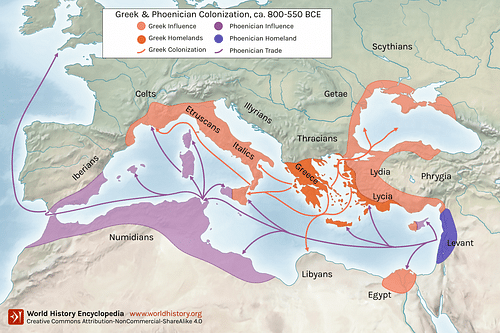
Ionia
Greeks created settlements along the Aegean coast of Ionia (or Asia Minor) from the 8th century BCE. Important colonies included Miletos, Ephesos, Smyrna, and Halikarnassos. Athens traditionally claimed to be the first colonizer in the region which was also of great interest to the Lydians and Persians. The area became a hotbed of cultural endeavour, especially in science, mathematics, and philosophy, and produced some of the greatest of Greek minds. Art and architectural styles too, assimilated from the east, began to influence the homeland; such features as palmed column capitals, sphinxes, and expressive 'orientalising' pottery designs would inspire Greek architects and artists to explore entirely new artistic avenues.
France & Spain
The main colonising polis of southern France was Phocaea which established the important colonies of Alalia and Massalia (c. 600 BCE). The city also established colonies, or at least established an extensive trade network, in southern Spain. Notable poleis established here were Emporion (by Massalia and with a traditional founding date of 575 BCE but more likely several decades later) and Rhode. Colonies in Spain were less typically Greek in culture than those in other areas of the Mediterranean, competition with the Phoenicians was fierce, and the region seems always to have been considered, at least according to the Greek literary sources, a distant and remote land by mainland Greeks.
The Black Sea
The Black Sea (Euxine Sea to the Greeks) was the last area of Greek colonial expansion, and it was where Ionian poleis, in particular, sought to exploit the rich fishing grounds and fertile land around the Hellespont and Pontos. The most important founding city was Miletos which was credited in antiquity with having a perhaps exaggerated 70 colonies. The most important of these were:
- Kyzikos (founded 675 BCE)
- Sinope (c. 631 BCE)
- Pantikapaion (c. 600 BCE)
- Olbia (c. 550 BCE)
Megara was another important mother city and founded Chalcedon (c. 685 BCE), Byzantium (668 BCE), and Herakleia Pontike (560 BCE). Eventually, almost the entire Black Sea was enclosed by Greek colonies even if, as elsewhere, warfare, compromises, inter-marriages, and diplomacy had to be used with indigenous peoples in order to ensure the colonies' survival. In the late 6th century BCE particularly, the colonies provided tribute and arms to the Persian Empire and received protection in return. After Xerxes' failed invasion of Greece in 480 and 479 BCE, the Persians withdrew their interest in the area which allowed the larger poleis like Herakleia Pontike and Sinope to increase their own power through the conquest of local populations and smaller neighbouring poleis. The resulting prosperity also allowed Herakleia to found colonies of her own in the 420s BCE at such sites as Chersonesos in the Crimea.
From the beginning of the Peloponnesian War in 431 BCE, Athens took an interest in the region, sending colonists and establishing garrisons. An Athenian physical presence was short-lived, but longer-lasting was an Athenian influence on culture (especially sculpture) and trade (especially of Black Sea grain). With the eventual withdrawal of Athens, the Greek colonies were left to fend for themselves and meet alone the threat from neighbouring powers such as the Royal Scythians and, ultimately, Macedon and Philip II.
Relationship with the Homeland
Most colonies were built on the political model of the Greek polis, but types of government included those seen across Greece itself - oligarchy, tyranny, and even democracy - and they could be quite different from the system in the founder, parent city. A strong Greek cultural identity was also maintained via the adoption of founding myths and such wide-spread and quintessentially Greek features of daily life as language, food, education, religion, sport and the gymnasium, theatre with its distinctive Greek tragedy and comedy plays, art, architecture, philosophy, and science. So much so that a Greek city in Italy or Ionia could, at least on the surface, look and behave very much like any other city in Greece. Trade greatly facilitated the establishment of a common 'Greek' way of life. Such goods as wine, olives, wood, and pottery were exported and imported between poleis. Even artists and architects themselves relocated and set up workshops away from their home polis, so that temples, sculpture, and ceramics became recognisably Greek across the Mediterranean.
Colonies did establish their own regional identities, of course, especially as they very often included indigenous people with their own particular customs, so that each region of colonies had their own idiosyncrasies and variations. In addition, frequent changes in the qualifications to become a citizen and forced resettlement of populations meant colonies were often more culturally diverse and politically unstable than in Greece itself and civil wars thus had a higher frequency. Nevertheless, some colonies did extraordinarily well, and many eventually outdid the founding Greek superpowers.
Colonies often formed alliances with like-minded neighbouring poleis. There were, conversely, also conflicts between colonies as they established themselves as powerful and fully independent poleis, in no way controlled by their founding city-state. Syracuse in Sicily was a typical example of a larger polis which constantly sought to expand its territory and create an empire of its own. Colonies which went on to subsequently establish colonies of their own and who minted their own coinage only reinforced their cultural and political independence.
Although colonies could be fiercely independent, they were at the same time expected to be active members of the wider Greek world. This could be manifested in the supply of soldiers, ships, and money for Panhellenic conflicts such as those against Persia and the Peloponnesian War, the sending of athletes to the great sporting games at places like Olympia and Nemea, the setting up of military victory monuments at Delphi, the guarantee of safe passage to foreign travellers through their territory, or the export and import of intellectual and artistic ideas such as the works of Pythagoras or centres of study like Plato's academy which attracted scholars from across the Greek world. Then, in times of trouble, colonies could also be helped out by their founding polis and allies, even if this might only be a pretext for the imperial ambitions of the larger Greek states. A classic example of this would be Athens' Sicilian Expedition in 415 BCE, officially at least, launched to aid the colony of Segesta.
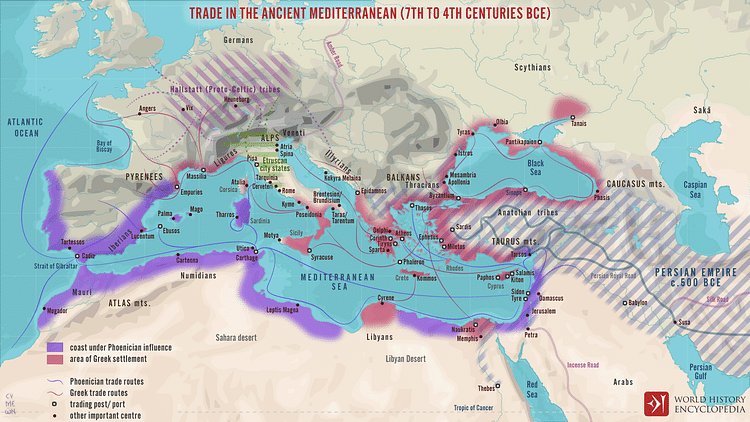
There was also the physical movement of travellers within the Greek world which is attested by evidence such as literature and drama, dedications left by pilgrims at sacred sites like Epidaurus, and participation in important annual religious festivals such as the Dionysia of Athens.
Different colonies had obviously different characteristics, but the collective effect of these habits just mentioned effectively ensured that a vast area of the Mediterranean acquired enough common characteristics to be aptly described as the Greek World. Further, the effect was long-lasting for, even today, one can still see common aspects of culture shared by the citizens of southern France, Italy, and Greece.
